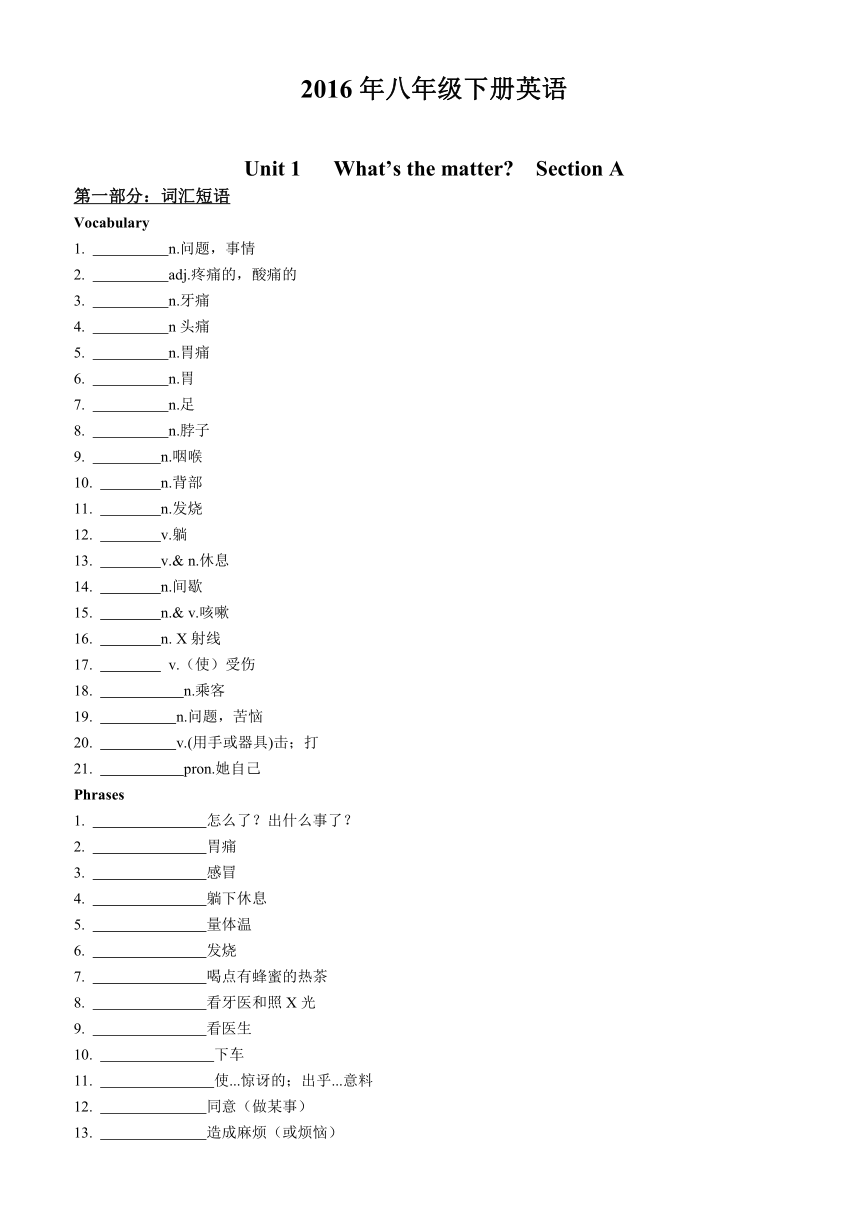
2016年八年级下册英语 Unit 1 What’s the matter Section A 第一部分:词汇短语 Vocabulary n.问题,事情 adj.疼痛的,酸痛的 n.牙痛 n头痛 n.胃痛 n.胃 n.足 n.脖子 n.咽喉 n.背部 n.发烧 v.躺 v.& n.休息 n.间歇 n.& v.咳嗽 n. X射线 v.(使)受伤 n.乘客 n.问题,苦恼 v.(用手或器具)击;打 pron.她自己 Phrases 怎么了?出什么事了? 胃痛 感冒 躺下休息 量体温 发烧 喝点有蜂蜜的热茶 看牙医和照X光 看医生 下车 使...惊讶的;出乎...意料 同意(做某事) 造成麻烦(或烦恼) 摔倒 上药 休息 第二部分:精讲精练 matter (1) matter n. 毛病;麻烦事 (2) matter vi. 要紧;有关系 主要用于否定句、疑问句或条件句中。 e.g. It doesn't matter. (3) no matter 与who, what, where连用,相当于whoever, whatever, wherever可引导让步状语从句。 e.g.:Don't speak loudly, no matter where you are. (4) get into trouble have trouble (in) doing sth. e.g. He prefers to tell a lie rather than get his friends into trouble. 例:( )What’s ____ with you A. trouble B. the matter C. the wrong D. matter ( )(2015重庆第一中学)I had so much trouble her WeChat number. You should thank me. A. To get B. getting C. gets D. get ache, sore, hurt区别 ache n. sore adj. hurt v. e.g. He hurts his leg. = His leg hurts. 描述身体不适 (1)主语+have/has+ a+病症 (2)主语+have/has+ a+部位-ache (3)主语+have/has+ a+ sore+发病部位 (4)部位+hurt(s) e.g:1).I have a . 我在发高烧。 2).I had a so I went to bed.我头疼,所以上床睡觉了。 3).I have a throat and my chest .我嗓子疼,胸口也疼。 句型变换 我牙疼。I have a .= I have a tooth.= My tooth .= My teeth are . with常见用法 prep. 1)表伴随关系 e.g. I went to Hong Kong Disneyland with my parents. 2)表示“使用某种工具、手段” e.g. You can cut it with a knife. 注:“当单数名词+with+名词”用作主语时,其谓语动词应用单数形式。 e.g. A teacher with his students is seeing an English film. 例: ( )You should drink hot tea _____honey. A. have B. has C. with D. For much+不可数名词 too much+不可数名词 much too+ adj./adv. e.g. Eating too much is bad for your health. ( )There’s rain on the road, so she should drive carefully. A. too much B. too many C. much too D. many too enough 1)adj. 修饰可数名词或不可数名词,放在被修饰的名词前后均可。 如:There are for them all. 有足够的座位让他们都坐下。 2)adv. 用来修饰形容词或副词,放在所修饰词的后面。 如:He walks . 他走得够慢的了。 be+adj.+enough+to do sth. 足够... 做某事 e.g. This article is difficult enough for me to write. 例:( )The book is for us to read. A. good enough B. enough good C. too good D. good too ( )(2014米泉)This movie wasn't _____.He fell asleep half way through it. A.interesting enough B.enough interesting C.interested enough D.enough interested should用法 1)should 常用来表示劝告、建议 例:We_____ study hard. 我们应该努力学习。 You_____ play computer games. 你不应该玩电脑游戏。 3)should可译为“居然,竟然” e.g. I can’t believe such a gentleman should be so rude to the old. 4)should 表示猜测时,一般指按经验或逻辑判断, “照说应该,估计,想必” 例: ( )--When can I come for the photos I need them tomorrow afternoon. --They _____be ready by 12 : 00. A. c ... ...
~~ 您好,已阅读到文档的结尾了 ~~